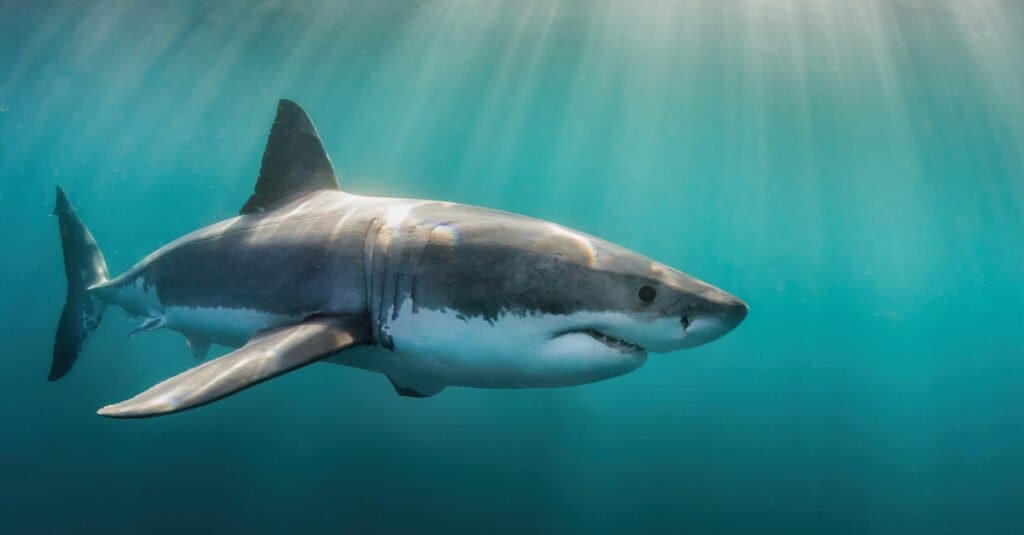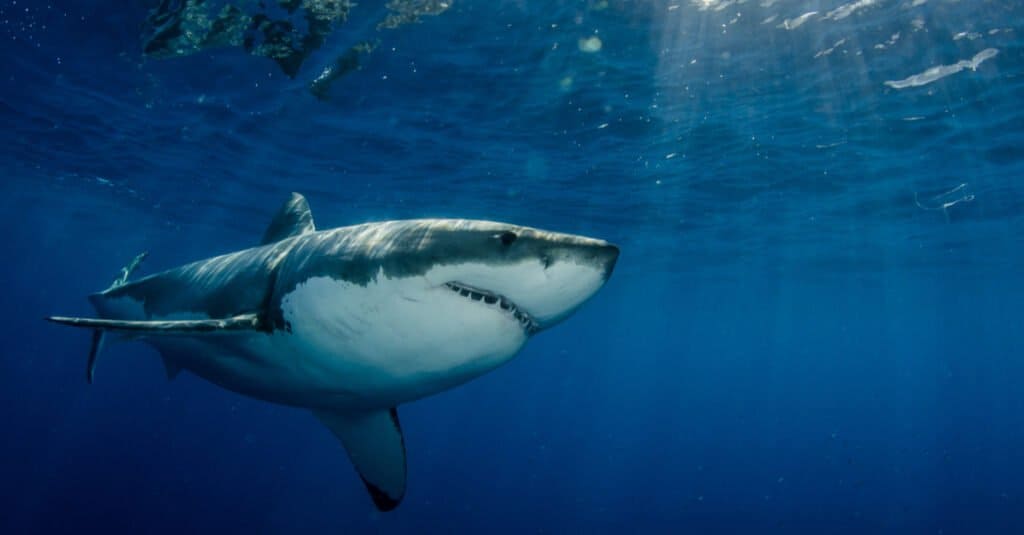Key Points:
- Researchers at OSEARCH have been tracking great white sharks that migrate seasonally along the east coast of the US. They believe reasons for the cyclical migration involve great whites returning to specific habitats in order to feed, reproduce, or mature.
- We’ve only learned the ages of older great white sharks in the past 10 years, after almost 30 years of study. The oldest great white shark on record lived to the age of 73.
- Hollywood has caused fear in people that great white sharks hunt humans and are creatures to be feared. Though they will attack humans under rare circumstances, great whites generally prey on porpoises, otters, seals, and sea turtles.
Update 12/16/2021: Over the past 8 years, researchers at OSEARCH have conducted an extensive study on great white shark migrational patterns, tagging and tracking 48 great white sharks along the eastern coast of North America. Recent data shows that the majority of these sharks remain off the coast of Canada through summer and into fall, only to migrate south into the Gulf of Mexico during winter. Variations in migratory pattern depend on size or sex of the sharks, female sharks tending to stray farther off shore during pregnancy, for example. Researchers believe reasons for the cyclical migration involve great whites returning to specific habitats in order to feed, reproduce, or mature. The study’s informative findings will allow conservation methods to be adjusted in order to preserve mentioned critical habitats and help to further improve the increase of great white populations regionally.
The oldest great white shark ever on record was a male shark who reached the ripe old age of 73 years before he died. Unfortunately, that is about all we know of him, and it took nearly 30 years for us to learn that much! If you search the “Oldest Great White Who Ever Lived” you won’t find a lot of information, and almost none of it is about the nameless shark who lived to be 73 years old. We have actually only learned the true lifespan of these sharks within the past 10 years, as strange as that seems. The great white shark (Carcharodon carcharias) is an amazing sea creature, but one that is often highly misunderstood.

The great white shark has 300 teeth set in seven rows.
©Fiona Ayerst/Shutterstock.com
There are several reasons why we don’t know more about these amazing fish. To begin with, Hollywood’s portrayal of great white sharks as man-eaters is almost entirely false, but the belief is still unfortunately widespread, so a lot of people don’t want to know more about these sharks. In truth, though they will attack humans under rare circumstances, great whites prefer smaller prey such as porpoises, otters, seals, and sea turtles. A person is far more likely to be killed by a jellyfish, a deer, or even a vending machine, than a great white.
Unlike many other animals, it has been difficult to study great white sharks closely while these sharks are still alive because their diet and need for constant movement means that great whites typically do not survive long in captivity. Some great whites only lasted a little over a week before they died because they refused to eat while captured. This inability to study them in captivity instead requires scientists either to research these sharks while they are in the sea, examine them for brief periods on boats, or learn about them once the sharks have already died. It has only been within the last decade that researchers have started using the bones of sharks to carbon date them to determine their ages. Most of what we know is based on a single study.
Because of these research difficulties, these amazing sharks were initially believed to live only about 20 years or so. It was thought that females lived shorter lives than males. However, recent data from carbon dating suggests great white sharks live much longer than that — as long as human beings. There is not currently enough data to determine if there is any difference in the lifespan between male and female great whites. Despite their longevity, and being found in all coastal waters around the world, their populations are considered vulnerable and conservation efforts are underway.
Finally, in 2014, scientists studying sharks published a paper revealing that they had begun carbon dating on a group of 28 great white shark cadavers. They did not provide a name for the oldest recorded great white ever discovered, just the number WS105, but records reveal that this male shark, who died in 1986, was estimated to have had a lifespan of around 73 years. The oldest female shark in the study group, WS81, had died in 1983 and lived only about 40 years.

The great white shark has an incredible sense of smell that helps it to detect prey from two miles away.
©Byron K. Dilkes/Shutterstock.com
The oldest known great white shark currently living is a female dubbed Nukumi, who is thought to be at least 50 years old. This makes her the second-oldest great white on record. She weighs over 3500 pounds and is 17 feet long. For comparison, the largest great white ever on record, Deep Blue, is estimated to be 5000 pounds and 20 feet long, and the oldest Greenland Shark is believed to be between 270 and 515 years old. Greenlands lack the calcification in their bones used to date great whites, but scientists eventually realized they could use radiation in the shark’s eyes to determine their ages. They have since started recalibrating their carbon dating and therefore the exact age of the Greenland shark is unknown.
Great white sharks are an ancient species that date back to the Miocene epoch of the Neogene Period. We have only begun learning about their lifespans in the last decade. What will the next 10 years teach us about these sharks? Is WS105 truly representative of the oldest age that a great white shark can reach? Or is it possible that there are other great white sharks out there who, much like their Greenland shark cousins, might actually have lived for hundreds of years?
Hopefully, if another older great white is finally found, that one will at least be given a name and not a number.
Check Out the Oldest Living Shark in the World
While there is very little information on the oldest living great white shark recorded, take a look at this amazing video which records the oldest shark in the world! And you won’t believe its age — it’s thought to be as old as 512 years! This particular Greenland shark could be the oldest living vertebrate in the world. Greenland sharks have been known to live for hundreds of years, and swim about in constant search of a mate. Check out the video to learn more.
The photo featured at the top of this post is © Jsegalexplore/Shutterstock.com
Thank you for reading! Have some feedback for us? Contact the AZ Animals editorial team.






